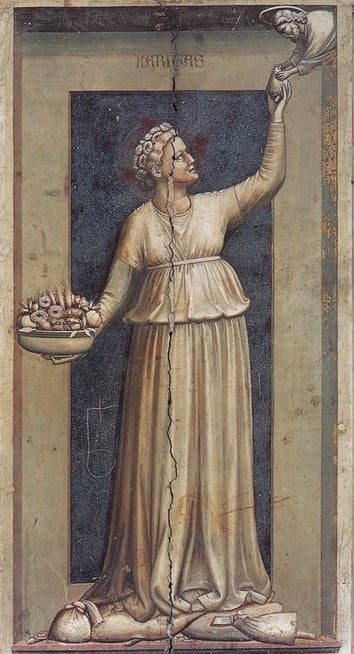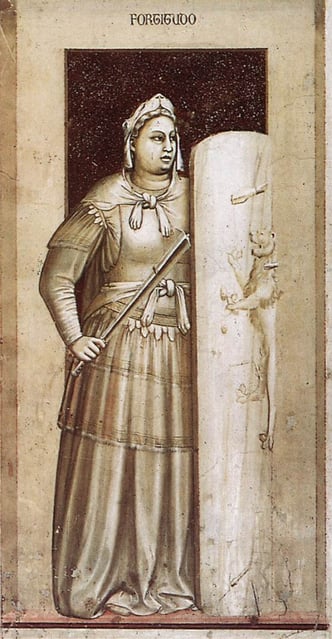Moral theology has traditionally explored how people act in the world (“moral”) in the context of their faith in God (“theology”). This volume purposely examines morality in the context of Christian belief. What difference does faith make in how a person lives his or her life? Surely a person of faith engages in certain distinctive activities, such as going to church, praying, and reading the Bible. But what about the myriad of activities that all people partake in every day, such as eating, facing difficulties, exchanging goods, and making decisions? Does the person of faith engage in these activities with the same “morality” as everyone else? As is already clear, a life of discipleship is not simply about performing certain types of actions. It is a vocation, a transformation of one’s very self. Such a transformation of course impacts how we act. The primary question for this chapter is, how does discipleship, a life of following Jesus, transform not only who we are but also how we act in this world?
The ancient notion of virtue will help us answer this question. A virtue is an abiding part of a person that disposes the person to act well. Obtaining a virtue changes who one is. It also explains how such a change in a person disposes one to act differently. Thus the first section of this chapter explains the concept of “virtue” in order to illustrate how changes in who we are lead us to act differently. The second section examines more closely one type of virtue: moral virtue. It identifies and defines the four main moral virtues, traditionally called “cardinal virtues,” which dispose us to good action in the types of activities noted above as shared by all persons, of whatever faith commitment. The third section explores how the four cardinal virtues have consistently been identified throughout the Western tradition (and even beyond) as the “hinges” to living a good life in this world. Even with this commonality, the cardinal virtues are also supple enough to invite interpretation by different worldviews. Thus, these virtues can lead people to different sorts of actions based upon people’s varying belief commitments. This points us toward the fourth section, which defines a certain sort of cardinal virtue that Christians have traditionally labeled “infused.” A fifth and final section explains why the infused cardinal virtues are essential to understanding how a life of discipleship transforms a believer’s life in this world.
Defining Habits and Distinguishing Virtues
As human persons we have all sorts of capacities: to eat, to make decisions, to allot goods, to have sex, and so on. We can exercise these capacities in numerous ways. A virtue is a habitual inclination to use a certain capacity well, or simply a “good habit.” Therefore, to understand a virtue it is necessary to understand the difference between simply performing actions and actually having a habit.[1] A habit is an abiding disposition that inclines one to exercise a specific capacity in a certain manner. It is a change of who one is, with a resulting change in what one does. Aristotle was making this point when he claimed that a person with a habit is still marked by that habit even when not exercising the habit’s activities.[2] For instance, a mathematician is still a mathematician even in her sleep. As a habit, a virtue is a quality that abides in us, even when it is not being acted upon. This is not the case for sporadic actions.
 |
| All images in this essay by Missional Volunteer; CC-BY-SA-2.0, unless otherwise specified. |
All these observations are true of habits in general. Habits incline us to act consistently, spontaneously, and with corresponding intentions. Virtues are good habits, and vices are bad habits. For example, people may give money to the poor to relieve their guilt, or to look good in front of others (as Christ himself describes in Matt. 6). And people do develop habits of doing good acts either to look good in front of others or to make themselves feel better. These habits are not virtues, but rather vices. The person with the virtue of generosity, however, gives money to the poor with the proper intention of seeking to alleviate distress out of genuine concern for people in need. A virtuous person not only consistently and automatically performs good actions, but also does so for the right reasons.
 There are a myriad of different virtues and vices. Perhaps you have heard of the seven deadly sins, either from Dante’s Divine Comedy or from the Brad Pitt movie. These are all vices. You have surely heard the expression “patience is a virtue.” Perhaps now that has more meaning than just “patience is a good thing.” There are many ways to group virtues (and vices, for that matter). One of the most important is by the type of activity being done well (or poorly, in the case of a vice). There is a virtue for using one’s sexuality well (chastity—which does not mean simply “don’t do it”), for enduring suffering well (patience), for believing true things about God and God’s relationship to humanity (faith), for seeking pleasures well (temperance), for seeking union with God in this life and fully in the next (hope), and for distributing goods well (justice).
There are a myriad of different virtues and vices. Perhaps you have heard of the seven deadly sins, either from Dante’s Divine Comedy or from the Brad Pitt movie. These are all vices. You have surely heard the expression “patience is a virtue.” Perhaps now that has more meaning than just “patience is a good thing.” There are many ways to group virtues (and vices, for that matter). One of the most important is by the type of activity being done well (or poorly, in the case of a vice). There is a virtue for using one’s sexuality well (chastity—which does not mean simply “don’t do it”), for enduring suffering well (patience), for believing true things about God and God’s relationship to humanity (faith), for seeking pleasures well (temperance), for seeking union with God in this life and fully in the next (hope), and for distributing goods well (justice).
Each virtue is named for the sort of activity being done well. A technical name for the “sort of activity” is the “object.” The numerous virtues can be placed into two broad groups based on whether their “type of activity,” or “object,” falls into one category or the other. The first category is called theological virtue, and includes the virtues faith, hope, and love.[4] What distinguishes these virtues is that their activities, or objects, all concern God directly.[5] We believe in God (faith). We love God above all else, and all things in God (charity, or love). We yearn for union with God, experienced fully only in the next life but tasted in this one (hope). When one engages in such activities well, one is said to have these “theological virtues.” They were examined more closely in the previous chapter. Since they concern God directly, and direct us toward ultimate union with God, they are not accessible to us without God’s help, or “grace.” Therefore we say they are “infused” virtues because they are given to us through the grace of God. We cannot acquire them on our own. In sum, the theological virtues concern God directly (object). They are obtained by grace, or infused, and concern our ultimate destiny with God.
 The second category of virtue consists not of virtues that concern God directly, but of those that concern inner-worldly activities. Such activities include eating, drinking, engaging in sexual relations, distributing goods, making practical decisions, and facing difficulties. Anyone who lives in our world must address how to engage in these activities.[6] Hence the objects of these virtues are called inner-worldly.[7] The group of virtues concerning such activities has often been labeled “moral virtues.” Given that the term “moral” is used so frequently and broadly, “moral virtues” will be called “cardinal virtues” here. Though the number of inner-worldly, or moral, virtues is rather large, the four “cardinal” virtues (prudence, justice, fortitude, and temperance) have long been posited in the Western tradition as encapsulating the virtuous life in this world.[8] Saint Thomas claimed that every single one of the myriad of virtues concerning inner-worldly activities could be grouped under one of these four virtues.[9] So generosity is a subvirtue of justice; chastity a subvirtue of temperance; patience a subvirtue of fortitude; and foresight a subvirtue of prudence. Therefore, what distinguishes cardinal virtues from theological virtues is that the objects of cardinal virtues are inner-worldly activities. The rest of this chapter explores the four cardinal virtues in more depth.
The second category of virtue consists not of virtues that concern God directly, but of those that concern inner-worldly activities. Such activities include eating, drinking, engaging in sexual relations, distributing goods, making practical decisions, and facing difficulties. Anyone who lives in our world must address how to engage in these activities.[6] Hence the objects of these virtues are called inner-worldly.[7] The group of virtues concerning such activities has often been labeled “moral virtues.” Given that the term “moral” is used so frequently and broadly, “moral virtues” will be called “cardinal virtues” here. Though the number of inner-worldly, or moral, virtues is rather large, the four “cardinal” virtues (prudence, justice, fortitude, and temperance) have long been posited in the Western tradition as encapsulating the virtuous life in this world.[8] Saint Thomas claimed that every single one of the myriad of virtues concerning inner-worldly activities could be grouped under one of these four virtues.[9] So generosity is a subvirtue of justice; chastity a subvirtue of temperance; patience a subvirtue of fortitude; and foresight a subvirtue of prudence. Therefore, what distinguishes cardinal virtues from theological virtues is that the objects of cardinal virtues are inner-worldly activities. The rest of this chapter explores the four cardinal virtues in more depth.
Naming and Defining the Four Cardinal Virtues
The four cardinal virtues are justice, prudence, temperance, and fortitude. Each of these is easily misunderstood, so it is worth pausing to state exactly what type of inner-worldly activity is done well by those possessing it.[10] First, consider justice. Aristotle famously claimed that we humans are social animals. Our lives are interdependent, such that living a good life must entail good relationships with other people. Justice is the virtue that inclines us to good action in our interactions and relationships with others. We may immediately think of the courts and the law when we hear “justice,” and such matters do indeed fall under justice. But any activity where we give another his or her “due” is a matter of justice. Honesty, generosity, keeping promises, respect, etc., are all matters of justice.
Another central component of human life in this world is bodily desire. We desire and act to obtain things that are pleasant to touch, taste, or experience. Such objects of our desire include food, drink, sex, and recreation. Any good life in this world will be marked by such desires, but these desires must also be well ordered. Temperance is the virtue of well-ordered desires for pleasures. When we hear the word “temperance,” we may think solely of alcohol, or even more specifically of the temperance movement in the early part of the twentieth century in the United States. A moderate desire for alcohol is indeed important for temperance, but temperance also includes desires for food, sex, and recreation. The person who drinks too much is acting “intemperately.” But so too is the person who is obsessed with video games, or who neglects important duties to spend leisure time with friends.[11]
Life in this world entails facing difficulties. Fortitude is the cardinal virtue that enables us to face difficulty well. “Courage” and “bravery” are synonyms of “fortitude.” When we think of bravery, we may immediately think of soldiers on the battlefield risking their life for their friends and nation. This is indeed an example of bravery. In fact, since the greatest danger we can face in this life is our own death, a willingness to literally lay down one’s life has always been seen as the paradigmatic act of fortitude. Yet this virtue may also be demonstrated in any difficulty in life, such as a sick person facing the sickness well, a student “stepping up” during stressful exam periods to perform well, or a person enduring pain after a hard breakup. These are all examples of fortitude.
 The final cardinal virtue is perhaps the most difficult to understand. In all areas of life we have to make practical decisions that guide our actions. Even if we “mean well” and have good desires, we must choose well to effect those good desires. Prudence is the virtue of doing practical decision-making well. When we hear the word “prudence,” we commonly think of being cautious and wary. At times the virtue prudence may indeed call for cautious hesitation. But it may also call for decisive action. In all cases, one acts prudently when one accurately sizes up the situation at hand and makes good practical decisions. This virtue is particularly important, because it is required for the exercise of the other cardinal virtues.[12] One may desire to drink moderately, but without an accurate grasp of what constitutes moderate drinking, one cannot effect that desire. One may desire to help those in need by giving money to a charity. But if one contributes to a fraudulent charity, then the poor are never served. Surely we can make poor decisions out of unavoidable ignorance.[13] But the prudent person uses the good sense she is capable of to choose well concerning all activities in this world.
The final cardinal virtue is perhaps the most difficult to understand. In all areas of life we have to make practical decisions that guide our actions. Even if we “mean well” and have good desires, we must choose well to effect those good desires. Prudence is the virtue of doing practical decision-making well. When we hear the word “prudence,” we commonly think of being cautious and wary. At times the virtue prudence may indeed call for cautious hesitation. But it may also call for decisive action. In all cases, one acts prudently when one accurately sizes up the situation at hand and makes good practical decisions. This virtue is particularly important, because it is required for the exercise of the other cardinal virtues.[12] One may desire to drink moderately, but without an accurate grasp of what constitutes moderate drinking, one cannot effect that desire. One may desire to help those in need by giving money to a charity. But if one contributes to a fraudulent charity, then the poor are never served. Surely we can make poor decisions out of unavoidable ignorance.[13] But the prudent person uses the good sense she is capable of to choose well concerning all activities in this world.
Cardinal Virtues as the Path to the Good Life in this World
The cardinal virtues may rightly be called the path to the good life in this world. These four virtues, and all the “subvirtues” under each of the four, “cover” all aspects of a good life as it concerns activities in this world. In fact, the very term “cardinal” comes from the Latin word for “hinge,” since a good life is said to “hinge upon” these virtues. There is actually remarkable consistency throughout the Western tradition in affirming the centrality of these virtues for the good life.[14] They may be found in Scripture, where the book of Wisdom, describing God’s Spirit of Wisdom, claims
she teaches moderation and prudence,
justice and fortitude,
and nothing in life is more useful for men than these.
(Wis. 8:7 NAB)
Plato uses these four virtues to describe both the well-ordered society and the well-ordered individual.[15] Cicero also reduces all virtues to these four.[16] Saints Augustine, Gregory the Great, and Thomas Aquinas are just a few of the Christian thinkers who appeal to the four cardinal virtues when describing the moral life.[17] Thus there is a remarkably consistent emphasis in the Western tradition on the importance of the cardinal virtues in the moral life, and this witness extends beyond the Christian tradition.
What can account for this consistency? Since the cardinal virtues concern “inner-worldly activities,” any person or society, regardless of beliefs or religious commitments, must have some vision (explicitly stated, or just implicitly seen in how people act) of how to engage in these activities well. All persons everywhere face difficulties, desire sensual goods, relate to others, and make practical decisions. Living in this world necessarily entails these activities. Therefore we say that the cardinal virtues are “accessible to reason” because all rational persons engage in these activities and can at least in principle discern how to do them well.
Nevertheless, it would not be accurate to say that therefore all these voices in the Western tradition share a solitary vision of what is morally right and wrong. This points us to another observation about the cardinal virtues. The cardinal virtues incline their holder to act well in different areas of life: making practical decisions, desiring pleasures, relating to others, and facing difficulties. Yet what exactly constitutes “acting well” in each of these areas? The traditional answer to this question has been that virtue resides in the “mean,” or middle course. In other words, the brave person (i.e., fortitude) is neither too cowardly nor too foolhardy. The chaste person is neither too promiscuous nor too prudish. Virtue lies in the mean.
Perhaps we can all agree on this claim that virtue lies in the mean. But this really just pushes back one step further the question of what constitutes good or bad action. What constitutes promiscuity, or being too prudish? A virtue approach to morality has the advantage of being supple. It can accommodate individual, as well as cultural, differences as to what constitutes, say, temperance concerning alcohol. Nonetheless, a virtue approach is not so abstract or “formal” as to render anything potentially virtuous. What guards against such a contentless morality is the reliance of the virtue approach on paradigmatic actions to exemplify each virtue.[18] For instance, bravery is paradigmatically described as a willingness to lay down one’s life for an important cause. We can certainly debate which of our country’s wars are just and thus warrant laying down one’s life, or whether the circumstances in a particular battle justify a retreat. But on no one’s terms is it brave to abandon one’s countrymates in the heat of battle. That is cowardice.
 Nonetheless, though a virtue approach to morality is not completely contentless, it is flexible enough to require further specification. In other words, saying “be temperate in your use of alcohol” is a good start, but more is needed. And thus identifying the relevant virtue is only the start of this process of discerning how to act well in a particular situation. For instance, virtue discussions of alcohol use assume there is a mean of temperance, and ways to deviate in excess or defect. But where the lines are drawn is something that needs to be specified through further examination of the particular activity at hand. For what purposes is alcohol being used? How does alcohol impact the body? What social forces are at work inclining one toward or preventing one from alcohol use? What influence does an individual’s history or physique have on the decision to use alcohol? Further prudential reflection, at both the individual and communal levels, serves to further specify the mean of temperate alcohol use.[19]
Nonetheless, though a virtue approach to morality is not completely contentless, it is flexible enough to require further specification. In other words, saying “be temperate in your use of alcohol” is a good start, but more is needed. And thus identifying the relevant virtue is only the start of this process of discerning how to act well in a particular situation. For instance, virtue discussions of alcohol use assume there is a mean of temperance, and ways to deviate in excess or defect. But where the lines are drawn is something that needs to be specified through further examination of the particular activity at hand. For what purposes is alcohol being used? How does alcohol impact the body? What social forces are at work inclining one toward or preventing one from alcohol use? What influence does an individual’s history or physique have on the decision to use alcohol? Further prudential reflection, at both the individual and communal levels, serves to further specify the mean of temperate alcohol use.[19]
Yet if the cardinal virtues concern inner-worldly activities that are in principle accessible to reason, why are there so many different understandings of what constitutes a just, or brave, or prudent, or temperate act? How can some societies regard hara-kari as honorable and others condemn it as suicide, and wrong? How can societies hold such radically different views of gender or race relations, or of what constitutes virtuous sexuality or alcohol use? Some individual and communal differences as to what constitutes virtuous action reflect the simple truism that the good life has many expressions. But some differences seem incompatible with each other, and not so easily explained. Even though the activity is inner-worldly and in principle accessible to unaided human reason, “the way things really are” concerning that activity may be contested. For instance, what is the true purpose of sexuality? Different people may disagree on this, or even that there is a “real purpose” of sex. Are men and women truly equal, and if so should that equality be instituted in a society? Clearly people continue to disagree on this. This does not necessarily mean there is no such thing as temperance or justice. It simply means that people disagree on the meanings of inner-worldly activities, or “the way things really are” in this world. There are many possible explanations for these differences (such as malice, ignorance, etc.), but another important cause is that one’s understanding of “the way things really are” concerning inner-worldly activities is importantly shaped by one’s beliefs about “the way things really are” concerning God and God’s relationship to humanity. In other words, what one believes about God does indeed shape how one regards inner-worldly activities, and judges whether or not they are being done well. Of course, all differences about cardinal virtues such as temperance and justice do not boil down to differences of faith. However, neglecting the impact of faith on how one lives in this world leads to an impoverished view of the cardinal virtues. Understanding the “infused cardinal virtues” prevents just such a mistake.
Explaining the Infused Cardinal Virtues
We have yet to attend to the question of how the cardinal virtues are obtained, or more dryly, the “efficient cause” of these virtues. Since virtues are good habits, the most obvious way they are obtained is through repetitive, intentional action. If you want to become a generous person, you must repeatedly, and for the right reasons, help those in need with what resources are available to you. By continually performing such actions, a habit develops such that you will be disposed to do more such actions (automatically, with proper intentions) in the future. Oftentimes developing a good habit, or virtue, means overcoming a bad habit, or vice.[20] If I am stingy or greedy, developing the virtue of generosity will mean first refraining from acting on my stinginess (by, say, not giving alms to the poor or not lending out my possessions to those in need) out of a desire to be generous (by, say, giving up some of my own goods to help those in need). An initial vice is an obstacle to overcome on the path to virtue, though it does not prevent one from developing a virtue. Thankfully, people do change. Of course, one can also change by losing a virtue, and so even those who possess a virtue must continue to act upon it lest they lose it in favor of a contrary habit, or vice.
When one acquires a cardinal virtue, one performs inner-worldly acts well with an eye toward how they contribute to human flourishing. In other words, I drink moderately (i.e., temperately) because I want to maintain bodily health and consistently enjoy this sensual good. I am generous because I want to contribute not only to my own well-being but also to that of others in my community, since I understand the two as intertwined. People are able to understand, through the use of their reason, natural human flourishing, as it includes things like bodily health and the common good. Since it is our created nature that flourishes here, and we can understand this type of flourishing with our reason, such flourishing is called our “natural end,” or goal. It is “natural” to us not in the sense that everyone achieves it, or even that everyone fully understands what constitutes natural flourishing, but rather in the sense that it completes or perfects our created nature and is accessible to our human reasoning.
Yet, as already hinted at earlier in part 2, Christians believe that humans are invited by God to share in a greater destiny. This destiny is called, literally, a “supernatural” destiny, and is constituted by union with the triune God of Jesus Christ who became man for us to reconcile us with God and make us (astonishingly!) sharers in the divine nature (2 Pet. 1). This is a destiny that far transcends our unaided created nature and unaided powers of reasoning. We could not “get there” on our own. In fact, we cannot even begin to comprehend this invitation, let alone live it out, without the assistance of God’s grace.
So how can it be understood or achieved? God gives us the grace to truthfully understand who God is, and his plan for humanity (faith). He bestows on us a love of God and others in God, such that we seek to be unified with God in communion with others (charity). He fills us with a longing for that union—tasted in this life and completed in the next—even when it is not fully available to us now (hope). Therefore Christians can be virtuous in their relationship with God thanks to God’s help, or grace.
What does this have to do with the cardinal virtues? Christians, like all human persons, live in this created world and continue to engage in “inner-worldly activities.” To do these well they, like all others, need the cardinal virtues of prudence, justice, temperance, and fortitude. At this point it would seem that the only thing distinguishing Christians and non-Christians is the presence of faith, hope, and love. Christians have the infused theological virtues to guide them to union with God, a supernatural destiny. But all persons—Christian or not—have the cardinal virtues that are acquired by the process of habituation and direct us to do inner-worldly activities well for the sake of natural human flourishing. On this read, in fact, there is really no difference between how Christians act well in the world and how virtuous non-Christians act well. There is simply a “human” ethic for inner-worldly activities, and so the cardinal virtues incline all people toward the same sorts of actions.
There are kernels of truth in saying that Christians and non-Christians both have these acquired cardinal virtues. First of all, for many inner-worldly activities, it simply does not matter whether or not one is Christian. If you want a good exercise trainer, it is probably not necessary to ask if he or she is Christian! Physical training is an inner-worldly activity accessible to unaided human reason that looks the same for Christians and non-Christians alike. The same is true of many questions of justice. A non-Christian judge can be just as knowledgeable in American law and render just judgments as a Christian judge. Second, it is true that Christians can work hard to obtain cardinal virtues concerning inner-worldly activities. So Christians can work hard to diet so as to be physically fit, or try to be more patient with people that may annoy us.
 However, sometimes inner-worldly activities look different for Christians because of their Christian faith. Thomas Aquinas uses the example of fasting.[21] During Lent Christians may fast and eat less than three square meals a day on, say, Good Friday. To make a sacrifice joining us to the ultimate sacrifice of Christ, and to subordinate our more basic desires for the sake of our deeper desire for the Lord, we eat less than we normally do. This action concerns an inner-worldly activity, i.e., eating, and thus is a matter of the virtue temperance. So fasting Christians are said to be temperate. But on that same day virtuous nonbelievers may eat their standard three square meals. They, too, are eating temperately. How to explain this difference?
However, sometimes inner-worldly activities look different for Christians because of their Christian faith. Thomas Aquinas uses the example of fasting.[21] During Lent Christians may fast and eat less than three square meals a day on, say, Good Friday. To make a sacrifice joining us to the ultimate sacrifice of Christ, and to subordinate our more basic desires for the sake of our deeper desire for the Lord, we eat less than we normally do. This action concerns an inner-worldly activity, i.e., eating, and thus is a matter of the virtue temperance. So fasting Christians are said to be temperate. But on that same day virtuous nonbelievers may eat their standard three square meals. They, too, are eating temperately. How to explain this difference?
Some different virtuous actions are explainable by different circumstances. One person’s temperance may entail more food than another’s, simply due to a larger body size. But that is not the case here. Both actions are temperate, but they differ not due to circumstances but in their very meaning. Nonbelievers are temperate for the sake of natural human flourishing. Christians are temperate for the sake of union with God. The goal of the former’s temperance is the natural end of humanity. The goal of the latter’s temperance is the supernatural end of humanity’s union with God. So the actions differ in meaning, or ultimate goal. They also differ in source. Though Christians may work hard to fast, ultimately these temperate acts require the assistance of God’s grace. Since we are incapable of acting on our own for the sake of union with God, this temperance is rightly called “infused” because eating in this way would not be possible without God’s grace. Hence in this example we have two different types of virtues: the infused cardinal virtue of temperance (fasting during Lent), and the acquired cardinal virtue of temperance (three squares a day for the nonbeliever).
Nonbelievers are temperate for the sake of natural human flourishing. Christians are temperate for the sake of union with God.
Eating is certainly not the only inner-worldly activity that is transformed by a Christian’s call to union with God, and assisted by God’s infused grace. Many worldly activities of Christians are transformed by our relationship with God, and so are done differently. Consider the cardinal virtue fortitude. Firefighters and other first responders can develop this acquired virtue, risking their lives to help citizens in danger. Christians can do this as well, but they see the ultimate act of fortitude to be laying down one’s life for one’s faith in God, which is called martyrdom. The early church martyrs are fine examples of infused fortitude, as are contemporary figures such as Saint Maximilian Kolbe and Martin Luther King, Jr. Kolbe was willing to lay down his life in place of a fellow prisoner in a Nazi concentration camp, not simply for the natural end of saving a person with a family, but also in imitation of Christ’s willingness to die for us and in hope of future union with God beyond this life.
As for the cardinal virtue justice, surely a virtuous non-Christian can be willing to lay down his life for social justice (e.g., racial or economic equality). But a Christian might do this differently. Anyone who has read Martin Luther King’s work knows that he was committed to racial equality not only for the sake of humanity’s natural end (social justice), but also for the sake of his and humanity’s ultimate union with God. He pursued justice in a manner shaped by Christ’s injunction to love the enemy, and turn the other cheek. Archbishop Oscar Romero spoke out for economic justice on behalf of the poor not simply because the conditions of his society impeded natural human flourishing, but also because they violated the dignity of people created in God’s image, and particularly the poor, for whom God has a special love.
These examples reveal that cardinal virtues, while always concerning inner-worldly activities, actually come in two different stripes. And therefore there are ultimately three types of virtues. First, there are infused theological virtues. These concern God directly, and thus are obtained only with God’s grace. Second, there are acquired cardinal virtues. They concern inner-worldly activities. They are accessible to unaided human reason and acquired by our own efforts. They direct us toward human flourishing considered simply at the level of our created human nature. Finally, there are also infused cardinal virtues. These concern inner-worldly activities as well. Yet they incline us to do inner-worldly activities well in the larger perspective of our supernatural destiny. They give a different meaning to those activities, commonly leading to different particular actions.
The Significance of the Infused Cardinal Virtues
Why is any of this important? Is it simply an abstract theological claim that there are not only infused theological and acquired cardinal virtues, but also infused cardinal virtues? Categorizations often help us understand more about what is being categorized. This is certainly the case with the infused cardinal virtues. People who neglect the existence of this type of virtue fail to see accurately a crucial facet of the Christian life. They may rightly note that people can acquire on their own certain cardinal virtues concerning inner-worldly activities. And they might even recognize that God helps people to be in right relationship with him by infusing the theological virtues of faith, hope, and love. But if these two categories of virtue were all that existed, something important would be missing. We suggest three reasons for why the infused cardinal virtues are so important in the Christian life, and thus why something is “missing” when they are not attended to.
First, Christian faith transforms not just a person’s relationship with God, but also a person’s inner-worldly activities. The problem with a two-fold categorization of virtue, which attends only to infused theological virtue and acquired cardinal virtue, is its failure to account for how our worldly activities are transformed by our faith. Simply put, Christian faith matters for how we live, including those activities that nonbelievers can do virtuously. We have already seen the case of fasting, which provides an obvious example of Christian faith transforming how one goes about an inner-worldly activity. There are many other such examples. Consider the political example of Saint Thomas More, who refused to acquiesce to King Henry VIII’s demand that he recognize an illegitimate marriage. More’s infused justice precluded him from doing so, and his infused fortitude gave him the grace to endure martyrdom because of it. Or consider the contemporary example of the United States Bishops, whose stances on political issues differ from our prevailing Republican and Democratic views on justice in their attention to life at all stages, and to the preferential option for the poor. This “infused justice” is not simply the same as secular forms of justice, but rather is transformed by Christian beliefs. The very content of their positions is shaped by the infused cardinal virtue of justice.
As noted above, sometimes the action performed by someone with an acquired a cardinal virtue does look the same as one performed by someone with an infused cardinal virtue. If you want a good trainer, his or her faith commitment is probably not very important. And surely people with either infused cardinal virtues or acquired cardinal virtues can pursue racial equality in the same manner espoused by King. That said, even in these cases where the external act may be the same, the meaning of the action is still slightly different. The Christian trainer may understand her work as a way of honoring the bodies God gave us, as really a form of worship. The nonbeliever would not consciously share this perspective. Similarly with King, anyone who has read him knows that he understood his work for social justice to be directly related to his own faith and the larger Christian project of helping to instantiate the kingdom of God. A socially just atheist could surely join King, but the overall meaning of the act would be different.
Thus the first reason why we must attend to the infused cardinal virtues is to see how Christian faith transforms a person’s inner-worldly activities. At times this leads the believer to different sorts of actions. Different ultimate ends can lead to different understandings of what constitutes truly just, temperate, brave, and prudent action.[22] Yet even when the one with infused cardinal virtue performs acts that appear the same to the external observer as the ones performed by someone with acquired cardinal virtues, those acts nonetheless possess a different overall meaning due to their relation to the supernatural destiny of the person.
The second reason why we must attend to the infused cardinal virtues is the Christian belief that people can receive God’s grace to help them become virtuous, not just directly in their relationship with God (faith, hope, and love) but also in their inner-worldly activities. This is readily seen in our liturgical and prayer lives. We commonly pray for God’s help in being more just, temperate, brave, and prudent people. We trust that God’s grace “works” in these areas as well. Consider the example of Saint Paul from Acts 9. He ceased his unjust persecution of Christians due to God’s direct intervention. Or consider Saint Augustine, who begged for God’s assistance in being rid of his lustful desires, and was granted that help in the famous story of his conversion in the garden.[23]
Christian faith transforms not just a person’s relationship with God, but also a person’s inner-worldly activities. The problem with a two-fold categorization of virtue, which attends only to infused theological virtue and acquired cardinal virtue, is its failure to account for how our worldly activities are transformed by our faith. Simply put, Christian faith matters for how we live.
These are obvious—and dramatic—examples of God’s grace helping people with inner-worldly activities. Unfortunately, due to the term “infused” and to the existence of such extraordinary stories of God’s grace, people too often assume that infused cardinal virtue is present only when someone has obviously been “zapped” by God’s grace in the manner of Saint Paul or Saint Augustine. But God’s grace can be just as present and efficacious for people who have less dramatic stories of God’s transformative impact on their lives. That grace can be present in the upbringing provided by holy parents, the challenging advice of a close friend, or the helpful example provided by a mentor. We say grace is present when someone is pointed toward his or her supernatural destiny of union with God. Such meaning and context for our virtuous action could not be present without God’s help, even when that help comes in less dramatic forms.
Differing from Saints Paul and Augustine are Saints Peter and Thomas Aquinas, who clearly exhibited infused cardinal virtues without extraordinary stories of being “zapped” by God’s grace. That does not mean God’s grace did not transform their lives; it most certainly did. What makes their cardinal virtues infused was that they came from God, and led to actions whose ultimate purpose was to unite them to God and to neighbors in and through God, which is of course their supernatural end, a destiny unknowable, let alone achievable, without God’s help. Acquired cardinal virtues may entail actions with the same “object,” but the ultimate source and ultimate goal of those activities would nonetheless be different.
The third and final reason why we must attend to the infused cardinal virtues is encapsulated in the famous Scholastic dictum “Grace perfects—rather than takes away or leaves untouched—nature.” We have talked a great deal in this chapter about humanity’s natural and supernatural ends. But there are two mistakes that are easy to make when discussing these two distinct ends. First, some assume that they persist as parallel tracks, with no relationship between the two. This chapter has been very explicit in asserting that this is not the case. Even seemingly “nonreligious” activities like physical training, eating, and fighting for racial equality are indeed transformed in the context of one’s supernatural destiny. We do not live hermetically sealed “natural” (or inner-worldly) and “supernatural” lives. Grace perfects nature, rather than leaving it untouched.
There is a second error in attending to humanity’s two distinct ends. Some people recognize that attention to our supernatural destiny impacts our inner-worldly activities, but go further and claim that believers should no longer seek and experience “natural” flourishing. The natural end is taken away and replaced by the supernatural end. Yet this opposite extreme also defies the Scholastic dictum that grace perfects—but does not take away or leave untouched—nature.
Since God’s grace perfects human nature even while transcending it, ironically complete “natural flourishing” is possible only for those who are assisted by God’s grace.
Some examples might help make this clear. Thomas again uses the example of fasting. Here is a case where infused temperance makes what one eats (e.g., during Lent) different for the believer. However, the “natural end” of eating is not taken away; rather, it is fulfilled and transcended in the broader context of one’s supernatural destiny. How does fasting respect the natural end while transcending it? Doesn’t it actually defy our natural end, since three square meals a day is the path to natural human flourishing as it concerns eating? Generally this is so. But just as we might fast a day before surgery, or “carbo-load” the day before a marathon, three square meals a day is not the only way of achieving our natural end. Furthermore, Thomas insists that if we were to fast so stringently that it actually harmed our natural bodily health, then we are fasting inappropriately.[24] Thus, grace fulfills and transcends, but does not destroy or leave unfulfilled, our nature.
 In fact, Christians have consistently maintained that though natural human flourishing is in principle accessible to unaided human understanding and action, in reality people are not able to live naturally flourishing lives due to the reality and pervasiveness of sin. Saint Thomas claims it is possible to act well toward our natural end, but only occasionally and with much error, primarily due to the finite and broken human condition. Therefore, since God’s grace perfects human nature even while transcending it, ironically complete “natural flourishing” is possible only for those who are assisted by God’s grace.
In fact, Christians have consistently maintained that though natural human flourishing is in principle accessible to unaided human understanding and action, in reality people are not able to live naturally flourishing lives due to the reality and pervasiveness of sin. Saint Thomas claims it is possible to act well toward our natural end, but only occasionally and with much error, primarily due to the finite and broken human condition. Therefore, since God’s grace perfects human nature even while transcending it, ironically complete “natural flourishing” is possible only for those who are assisted by God’s grace.
A good example of this is the relationship between love and justice. It is in principle possible to be a just person and have a just society without the theological virtue of charity, or love. However, as both the Vatican II document Gaudium et Spes and the recent Pope Benedict XVI encyclical Deus Caritas Est make clear, charity enables one to more perfectly see the beauty and dignity of other persons. This perfects (rather than leaves untouched, or destroys) our ability to be just, giving other persons their due. Thus the person with charity has a different sort of justice. It is still justice since it concerns inner-worldly relations with others. Yet it is transformed by God’s grace, and thus rightly called infused justice rather than acquired justice.
One more example may help illuminate this. Consider two believers who are married. As part of their shared life they go to church and understand their marriage to be a sacramental bond sustained by God’s grace. But that same grace also sustains them in “natural” aspects of their marriage, aspects of marriage shared by believers and nonbelievers alike. So one spouse may be granted infused virtue to be patient in times of strife and generous with time and attention. The other spouse may be granted infused virtue to be just in handling of finances and chaste in interactions with other people. All these virtues are in principle accessible to unaided reason, and indeed may be acquired by repeated actions and without further reference to any supernatural end by effort. But these Christian spouses are granted not only the infused theological virtues of faith, hope, and love, but also infused cardinal virtues to assist them in the “natural” facets of their marriage, and indeed to transform how those aspects are done in light of their supernatural end. In this case grace has clearly perfected—rather than taken away or left untouched—nature in a manner that may well be more complete than without God’s grace.
Conclusion
We have come a long way since the opening of this chapter and the seemingly simple question: What difference does faith make in how a person lives his or her life, especially with regard to those activities engaged in by all people, regardless of faith commitment? The concept of virtue provides a vehicle for explaining how persons can be transformed, and their actions subsequently impacted. The cardinal virtues in particular concern actions in this world, and apply to believers and nonbelievers alike. Nonetheless, how they are practiced is shaped by one’s faith commitments. Thus the infused cardinal virtues are essential for understanding how God’s grace can transform human action in this world. In dramatic or subtle ways, these virtues equip the believer to live an integrated life of discipleship, such that one’s relationship with God truly shapes all one does.
Editors’ Note: This chapter is reprinted from Gathered for the Journey: Moral Theology in Catholic Perspective, ed. David Matzko McCarthy and M. Therese Lysaught (Grand Rapid: Eerdmans 2007), which is reprinted with the publisher's permission.
This essay was first reprinted in Church Life: A Journal for the New Evangelization, volume 3, issue 4.
Featured Image: Lawrence Lew, OP; CC-BY-NC-ND-2.0.
Concurrent Readings
Lewis, C.S. Mere Christianity. San Francisco: HarperSanFrancisco, 2001. Lewis offers a helpful and very concise introduction to cardinal virtues in the context of a larger account of Christianity (pp.76–81).
Porter, Jean. Nature as Reason: A Thomistic Theory of the Natural Law. Grand Rapids: Eerdmans, 2005. Porter offers an advanced treatment of Thomistic ethics, and especially the relationship between virtue and other topics such as happiness and natural law.
Thomas Aquinas. Summa Theologiae. New York: Benziger Brothers, 1948. The most formative text for this chapter is without a doubt Saint Thomas Aquinas’s Summa Theologiae, particularly the Seconda Pars on the moral life. See especially Thomas’s general discussion of habits and virtues (I–II.49–70), and his detailed examination of each theological (II–II.1–46) and cardinal (II–II.47–170) virtue. Thomas himself was very influenced by Aristotle’s Nichomachean Ethics (books 2–6 are particularly important for the discussion of virtue).
Wadell, Paul. The Primacy of Love: An Introduction to the Ethics of Thomas Aquinas. New York: Paulist, 1992. Wadell offers a helpful introduction to Thomistic ethics and virtue in particular (pp. 106–24).
Notes
[1] For a helpful introduction to this topic, see C. S. Lewis’s Mere Christianity (San Francisco: HarperSanFrancisco, 2001), pp. 76–81, where Lewis describes the cardinal virtues and uses the example of a tennis player to distinguish having a habit from performing occasional actions.
[2] See Aristotle’s Nichomachean Ethics, pp. 927–1112, in The Basic Works of Aristotle, ed. Richard McKeon (New York: Random House, 1941), for a classic treatment of virtue. The discussion of habits (or “states of character”) is found in book 2, pp. 954–62.
[3] Recall David Cloutier’s chapter 6 earlier in this collection. There he describes how we humans act with purposes, for the sake of fulfillment. Intentions are those purposes.
[4] The classic place these are found in Scripture is 1 Cor. 13:13. But see also 1 Thess. 1:3.
[5] See Thomas Aquinas’s Summa Theologiae (New York: Benziger Brothers, 1948), I–II.56, for a detailed discussion of the theological virtues.
[6] This is true even of those who apparently decide not to do certain activities, such as the celibate person or the pacifist.
[7] John Paul II used the term “innerworldly” in the encyclical Veritatis Splendor, §65.
[8] This is seen in the work of Saint Thomas Aquinas, who actually uses the term “moral virtue” to refer to virtues concerning innerworldly activities, but on certain occasions employs “cardinal virtue” to avoid confusion. See Summa Theologiae, I–II.61. Thomas examines all moral virtues under the auspices of one of the four cardinal virtues. See II–II.47–170.
[9] Again here he is following the likes of Gregory the Great and Cicero, both of whom he cites at Summa Theologiae I–II.61.2 and 61.3, respectively.
[10] C. S. Lewis’s brief chapter on the cardinal virtues in Mere Christianity, cited above, was very formative for this section.
[11] We commonly assume that vices are always examples of excess, in the case of temperance, excessive desire for pleasure. This is understandable since this problem is by far the most common. But Aristotle and Thomas are clear that one can be “intemperate” by having too little desire for, and too few activities seeking, pleasure. This is clearly the case with eating, but can even be true of people who prudishly condemn anything pleasurable as sinful.
[12] For this reason prudence has traditionally, in both Christian and non-Christian sources, been called the “charioteer of the virtues” or “preeminent among the virtues.” See, for instance, Catechism of the Catholic Church, 2nd ed. (Vatican City: Libreria Editrice Vaticana, 1997), §1806.
[13] We see here the close relationship between prudence and conscience. Conscience is defined by the Catechism as the concrete judgment by reason of the moral quality of an act, as good or bad (see §1778). Though a treatment of conscience is beyond the scope of this chapter, in such a treatment one would explore whether an erroneous conscience, or acting wrongly out of ignorance, is blameworthy (vincible ignorance) or not blameworthy (invincible ignorance).
[14] There are even important commonalities between Western thought on the cardinal virtues and non-Western thought. See, for example, Lee H. Yearley’s Mencius and Aquinas: Theories of Virtue and Conceptions of Courage (Albany: State University of New York Press, 1990).
[15] See book 4 of Plato’s Republic, trans. G. M. A. Grube (Indianapolis: Hackett, 1974), pp. 85–109. This is one of the reasons why early Christians such as Justin Martyr thought Plato was exposed to the Old Testament (which is not true)!
[16] Thomas makes this claim at Summa Theologiae I–II.61.3, where he cites Cicero’s De inventione rhetorica.
[17] See Augustine’s The Way of Life of the Catholic Church (Washington, D. C.: Catholic University of America Press, 1966), book I, pp. 15, 19–28. See Gregory the Great’s Morals on the Book of Job, cited at Thomas’s Summa Theologiae, I–II.61.2. Thomas’s own treatment of the cardinal virtues is cited above.
[18] For more on this point, see Jean Porter’s Nature as Reason: A Thomistic Theory of the Natural Law (Grand Rapids: Eerdmans, 2005), p. 190.
[19] For the importance of the community in such reflection, see Pamela Hall’s Narrative and Natural Law: An Interpretation of Thomistic Ethics (Notre Dame, Ind: University of Notre Dame Press, 1994).
[20] For a helpful discussion of the stages of development of virtue, see Paul Wadell’s The Primacy of Love: An Introduction to the Ethics of Thomas Aquinas (New York: Paulist, 1992), pp. 106–24. Wadell bases his stages on Thomas’s Summa Theologiae, II–II.24.9.
[21] See Thomas’s Summa Theologiae, I–II.63.4.
[22] Recall the third section’s discussion about how competing views of “the way things really are” contribute to different understandings of virtuous inner-worldly activity.
[23] Augustine, Confessions, trans. Maria Boulding, O.S.B. (New York: Vintage Books, 1997), book 8.
[24] See Thomas’s Summa Theologiae II–II.147.1ad.2. Jean Porter discusses this text in her Nature as Reason, p. 390.



